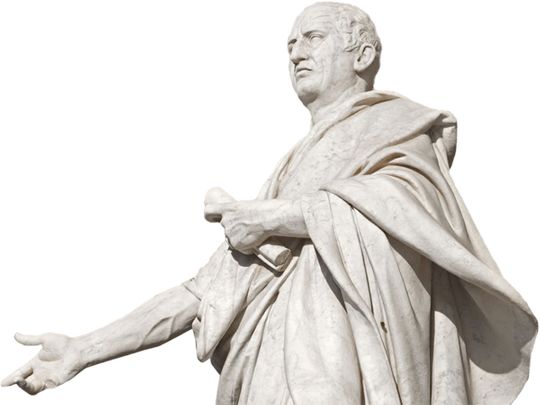
For someone’s reputation to have endured for more than 2,000 years, they must have been quite extraordinary. The Roman orator, statesman and lawyer Marcus Cicero is a towering historical figure, known for the way he stood as a beacon of reason in an empire full of cunning, dangerous men.
Click start to play today’s law-themed Word Search.
Born in 106BC, Cicero rose from relative obscurity to fame because of his talent for rhetoric, orations and political writing. He became a lawyer in his early 20s. Over the next three decades, he drafted and presented legal speeches that contained arguments spanning a broad spectrum of issues, from poisoning and bribery to citizenship rights and political offences.
Cicero quickly rose through the ranks to gain the position of consul in 63BC – the highest political office in the republic of Rome. Consuls held equal power to the political and military heads of state – they controlled the army, presided over the Senate and proposed legislation.
Because of his constant exposure to powerful people and court intrigue, Cicero knew men, and he believed Julius Caesar to be the worst man for the job of emperor. When they were striving for control of Rome, both Caesar and Pompey appealed to Cicero for his loyalty, and Cicero sided with Pompey. However, Rome’s civil war saw Caesar emerge victorious in 46BC as dictator perpetuo – dictator for life.
Despite Cicero’s snub, Caesar pardoned him and allowed him to return to Rome from Cilicia, a province in present-day Turkey, where he had accepted governorship. Caesar’s assassination occurred soon after, but Cicero's relief and his departure was short-lived. When Caesar's ally, Mark Antony, quickly tried to fill the emperor's boots, Cicero delivered scathing speeches against Antony in the Senate – through 14 epic orations called the Philippics – that fanned outrage against him. Cicero argued for the restoration of the republic and declared Antony a tyrant.
His efforts against Antony would lead to Cicero’s death. On a vengeful path, Antony sent soldiers tasked with the mission of executing Cicero and bringing back his severed head and right hand, to be displayed as trophies in the Roman Forum so that all could contemplate them. The soldiers caught up with Cicero as he tried to flee through the forest toward the port of Gaeta, from where he hoped to make his escape. He never did.
Cicero’s speeches are still used today to understand the fine balance between art and logic, that are necessary for successful advocacy. Helpfully, Cicero wrote down what he considered to be the essential rules of advocacy, and his list stands the test of time:
- Speak clearly
- Speak easily but not too much, especially when others want their turn
- Do not interrupt
- Be courteous
- Deal seriously with serious matters and gracefully with lighter ones
- Never criticise people behind their backs
- Stick to subjects of general interest
- Do not talk about yourself
- Above all, never lose your temper.
What do you think of the Roman orator and consul? Play today’s Word Search and let us know at games@gulfnews.com.



